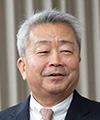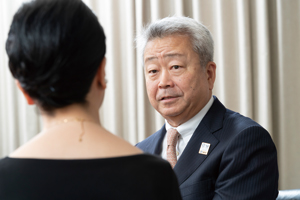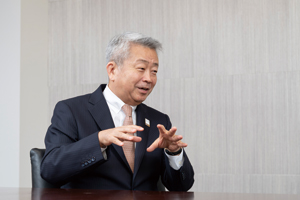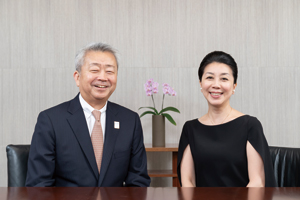 |
|
|
|
|
|
View from the Top Vol. 16, No. 10, pp. 1–5, Oct. 2018. https://doi.org/10.53829/ntr201810tp1  Creating a Rock-solid Foundation of Shared Values Based on “Connect, Trust, and Integrity”OverviewRanking 20th in this year’s “Brand Finance Global 500,” NTT has built up a global corporate brand and firmly established its position in the world. Jun Sawada, NTT President and Chief Executive Officer, states that a further transformation is needed to ensure growth in both the domestic and international markets. We asked him about his beliefs and management principles in light of this statement. Keywords: digital transformation, globalization, management principles Supporting customers, collaborating with partners, and striving for self-transformation are basic to the NTT Group°ĹMr. Sawada, how have you been approaching your duties since assuming this office? I have yet to settle down in my new position, but recognizing the importance of integrity in my work, I make an effort to graciously meet with those that come to offer explanations and hold discussions. As far as activities are concerned, I try to be proactive in my work. For example, immediately after my appointment was decided, I established a monthly meeting with the presidents of major NTT Group companies (presidents°« meeting) and began to create a mechanism to promote smooth communication. °ĹPlease tell us about your beliefs and management principles going forward. To begin with, let me point out that our previous president, Mr. Hiroo Unoura, implemented a variety of business reforms and raised operating revenues and operating income to record levels in fiscal year 2017. All in all, we are in very good shape at present. However, we are in a rapidly changing business environment, and to do even better, I believe it is necessary for us to undergo further reforms (digital transformation) to respond effectively to market changes and outdo the competition. In this endeavor, globalization is an important keyword. If we take up these challenges, I would like to incorporate the global market that is in the growth phase. Revenues in the markets outside of Japan currently account for 20% of our overall revenues, but I would like to expand even more. At the same time, we are encountering changing times in the Japanese market too. This is an era in which the number of subscribers to fixed (landline) telephones is declining every year while the number of mobile-phone subscribers is increasing. In this regard, we plan to switch over from this fixed telephone network to an IP (Internet protocol) network in a migration from the public switched telephone network (PSTN) scheduled for 2024, so it is imperative that we foresee and determine what services will be our core business in Japan going forward and promote a self-transformation. The purpose of management is to increase corporate value, so an effort must be made to raise profits. Basic principles can be summed up as supporting customers in their own transformation, collaborating with partners, and working toward our own transformation. Corporate contributions to society are referred to as CSR (corporate social responsibility), which I believe to be our main line of business. In short, our corporate activities are closely associated with social contributions. However, pursuing a self-transformation while making social contributions with integrity may appear to be contradictory at first glance. Nevertheless, by placing the three principles of °»connect, trust, and integrity°… at the root of our business activities and creating a rock-solid foundation of shared values based on these principles, I believe that we can expand our corporate activities with a good balance between self-transformation and social contributions and with a sense of unity among the roughly 300,000 employees of the NTT Group. °ĹWhat do you think is important for supporting well-balanced corporate activities? Of primary importance in corporate activities is °»people.°… At NTT, there are about 180,000 employees in Japan and about 120,000 in other countries throughout the world of different nationalities and cultures. Getting 300,000 people of different backgrounds to move in the same direction is not easy. However, I believe that doing our work while recognizing the diversity within the company will enable us to connect our efforts to both business and social contributions. I therefore felt the need for a mechanism that could facilitate communication among 300,000 people, so I set out to reform the communication structure that up to now had developed on a company-by-company basis. To begin with, I released a video letter in English to the entire NTT world at the time of my appointment as president. At this time, I greeted everyone with our head office in Otemachi, Tokyo, in the background, which generated many comments from employees around the world such as °»Ah, this is the head office!°… and °»This is much more realistic than paper-based greetings!°… My greetings in Japanese were delivered on paper, but some employees mentioned that they would have also enjoyed seeing a video letter oriented to employees in Japan. In this way, a new communication method was able to elicit a positive response. From here on, I intend to deliver a video letter to all employees at each event or milestone to help everyone grasp the state of the entire NTT Group. I have also established meetings for face-to-face discussions with executives of the global operating companies to promote communication. At the same time, I am encouraging the presidents of NTT Group companies to create opportunities for facilitating communication such as through discussions and meetings with employees and exchanges with all sorts of people. The idea here is to establish a communication platform with which to personally convey information and plans not only to the top management of each company but to employees also. I have also decided to have the top management of each major Group company participate in the formulation of NTT Group medium-term management strategies that have so far been drawn up by the holding company so that the strategy of individual companies can be reflected. The plan is to have NTT EAST, NTT WEST, NTT Communications, NTT DOCOMO, NTT DATA, and NTT Urban Development participate in the formulation of the next medium-term management strategy. However, while we are presently holding a presidents°« meeting twice a year for major Group companies, we have not as yet held a global presidents°« meeting. Looking to the future, I would like to make use of ICT (information and communication technology) to expand the presidents°« meeting globally while establishing a mechanism for occasional face-to-face exchanges. Meetings using telephones and video are fruitful, but I feel that holding face-to-face meetings at our head office here in Japan is meaningful in an entirely different way.
Introducing worldwide evaluation standards; delegating authority and sharing basic principles in policy-making in an 8-to-2 ratio°ĹUnifying the management team of a 300,000-employee corporation seems to be no easy matter. That°«s right. It°«s not that simple. Two years ago, we launched a company called NTT Security, bringing together five NTT Group companies and 1500 employees from 15 different countries. At that time, it was felt that it would be impossible for all of these employees to move in the same direction on receiving an order from the head office. It was therefore decided that 80% of policy making would be entrusted to the various regions with the remaining 20% left to the head office. A process of trial and error ensued until settling into this ratio, but in the end, we came to respect this 80% portion of policy-making that was working based on the actual state of affairs in each region. Principles, system decisions, etc., should fall broadly in line with the plans of the head office, but authority should be delegated for everything else. Japanese corporations are not very good at delegating authority. Sometimes, when people intend to delegate, it simply becomes impossible to do so, or while they claim to delegate, there is actually no delegation in the true sense of the word due to the reports that are being requested all the time. Evaluating the results of delegation based on clearly stipulated standards is now a worldwide trend. In terms of a worldwide standard of evaluation systems, a poor evaluation typically results in asking for the resignation of the person in charge while a good result means granting a bonus. In Japan, however, comprehensive and relative evaluations have been the norm, with the result that people have not been asked to resign. I would like to bring this situation in line with the global standard, which is already being practiced by our global companies. Leaving aside this extreme talk of having to resign from one°«s position or company, I would like to gradually introduce this idea and mechanism of delegating authority in our Japanese companies. However, culture cannot be changed overnight. It took our previous president, Hiroo Unoura, five or six years of steering the company before achieving record levels of profit and higher stock prices. Surely about the same amount of time would be needed to implement some other kind of major reform. I believe that the PSTN migration scheduled for 2024 will provide us with a big opportunity to transform our business within Japan. In addition, I would like to make it so that each and every employee can work in a proactive manner. In the past, whether I was in charge of sales or of the customer premises section (a maintenance department concerned with communication cables and terminals), I would analyze the data and make it visual (visualization) before presenting it to my subordinates. In the case of sales, I would convert the number of orders, for example, to a per-person value and arrange the data in a time series. In this way, employees could see trends and factors for themselves and establish appropriate work strategies on their own. As a result, sales doubled over a period of two and a half years. The time that I was in charge of maintenance was exactly the time that maintenance cost data was released. On working out the national average, for example, I found out that actual results (costs) ranked low regardless of whatever pride we could take in our technical abilities. On showing these results to highly skilled employees who had originally thought differently, the poor results roused them to action, and they voluntarily took steps in their work to remedy the situation. In the end, actual results improved by three times. On hearing about these improved results, branch offices would ask us, °»How in the world did you do that!°… These experiences reflect the importance of visualizing actual results and raising awareness. Many NTT employees are known for their excellence and integrity in their work. Given the appearance of some kind of problem, these employees confront the problem on their own in the manner of °»We must do something!°… and perform whatever work needs to be done systematically. Conversely, what I personally am capable of doing depends perhaps on how I can make people aware through visualization. However, if a trustworthy relationship has not been developed, visualization may not have much of an effect. Simply presenting results in a graphical manner is no guarantee that people will pay attention. I believe that creating an easy-to-work environment for employees is the job of top management. Although it can°«t be helped in a large organization, a problem in the workplace may be watered down as it makes its way up the chain of command, preventing the true nature of the problem from being understood. To solve this, I would like to delegate more authority so that on-site employees are committed to results in their work. I think this is a sound approach to work.
Let°«s work to make people happy°ĹTechnology is a keyword alongside people as a pillar for promoting reform. What thoughts or ideas do you have on this? All things considered, I understand that technology provides an opportunity for changing the world. The relationship between technology and people and society can be thought of as that between innovation and markets. These two processes work together, but in the end, no reform will occur without innovation coming first. In this sense, there are great expectations of our research laboratories. In recent years, technical innovation has been expanding as has marketing technology. The barriers between them have been disappearing, and as part of this flow, °»incubation°… has come to be done, leading to the creation of new products and services. Information communications is a tool, and providing value to people and society through this tool is important. We would like the tools that we provide to be used in medical care, healthcare, transport, and many other fields, and we therefore must develop technologies that are indispensable to partners in various fields. What supports this activity is research and development (R&D). While it is common to simply say °»R&D,°… there can be no °∆D°« (development) without °∆R°« (research). My goal is to become the world°«s best in both °∆R°« and °∆D°« by discerning technology trends and formulating and developing an R&D strategy with the growth of both °∆R°« and °∆D°« in mind. To this end, I will hold discussions with the Research and Development Planning Department and announce our direction at the next NTT R&D Forum. °ĹWhat fields in NTT R&D do you think require urgent attention? One would be robotics°ĹI think there is a real need for useful robots. Whether they are shaped as a camera, a desk, or whatever, any robot having elements that can make people happy is good. And for that matter, any work that can provide something that people can take great pleasure in is worthwhile. In addition to the field of robotics, there are many others, including artificial intelligence, genomics, advanced self-driving cars, drone navigation management, flexible Internet of Things sensing, brain-machine interfaces, and micro-robots. I have so many ideas on each of these fields that it°«s difficult to put them into words. However, if I were to talk about one, it would be a software platform that I would call a °»cognitive foundation.°… This platform would have the role of connecting a variety of things and processing and storing the data obtained. In simple terms, processing would be handled on the cloud and stored in storage equipment, and the linking of the two, that is, the connected portion, would constitute a network. In other words, all sorts of things are connected via the network portion and analyzed as big data. However, this network portion (the linked portion) is achieved by software, but no robust software platform exists as yet. This level of connection can be achieved by the fifth-generation mobile communications system (5G), but 5G is still only part of the public network. Generally speaking, there are local area networks, factory systems, and other things outside the public network, but without end-to-end connections, they are meaningless, becoming much like the boa constrictor in the famous novella The Little Prince (°»What is essential is invisible to the eye°…). For example, if each company involved in the field of self-driving cars creates its own system, how to connect these systems becomes an issue. The word °»cognitive°… refers to the ability to perceive and make connections even for things different in nature. This cannot be done without software. In other words, there is a need here for a multi-orchestration capability. On another matter, I can imagine a business that converts electric power to direct current (DC) and makes an NTT exchange (central office) into an energy storage station for charging electric vehicles or for supplying local businesses with power. Batteries and solar power generators all use DC, and many motors such as those of electric vehicles likewise run on DC, so converting real-world equipment to DC would make for more efficient operations. Furthermore, since natural energy is becoming easier to use, such a business plan could help ease global warming. Such an initiative has yet to be launched on a global basis, but I think it could be done in Japan to provide something very useful for people and society throughout the world. °ĹAn opportunity for Japan to contribute to the world seems to be taking shape. Is there anything that touches a chord with you on becoming president? My job is to reply to a variety of requests coming from all around me and to resolve any problems that come up. The scale and global impact of NTT is large, so I°«m always asking myself whether my knowledge and experience are commensurate with my position as president and always thinking that I need to continuously improve my skills. In addition, I strive to make decisions as quickly as possible in all sorts of scenarios and to convey them clearly. In the case of a difficult subject, I tell them whether or not we should conduct a study, and once a mutual understanding is reached as to do or not to do that, I want to get the matter settled. Moreover, if someone should come up with a good idea along the way, I want to incorporate that idea without hesitation and quickly adopt what is considered to be correct regardless of what may have been said before. I believe that this approach reflects a sense of integrity in the end. °ĹMr. Sawada, can you leave us with a message for all employees of the NTT Group? I believe that we are in a very good state at present, but technical innovation and social trends are rapidly changing beyond our expectations. Please confront these changes head-on through your own transformation from your own position. In actuality, it°«s a continuous process of improvisation no matter how much you try to prepare. But if you understand that, you will be unbothered by even a major problem. In addition, it°«s better to enjoy whatever you°«re doing. Being enthusiastic and energetic about your work will create a virtuous cycle. Let°«s join hands in creating a more enjoyable society!
Interviewee profileCareer highlightsJun Sawada joined Nippon Telegraph and Telephone Public Corporation (now NTT) in 1978. After serving as manager of communication lines and other network facilities, he became NTT America Vice President in 1998. In 2000, he moved to NTT Communications, and after serving as Head of the Corporate Planning Department, Executive Manager of Consumer and Office Users Business Division, and General Manager of the Kansai business office, he became Senior Vice President and Executive Manager of the Corporate Strategy Planning Department in 2008. He then became Representative Director, Senior Executive Vice President of NTT in 2014, serving concurrently as Chief Executive Officer of NTT Security from 2016. He assumed his present office in June 2018. |
|











